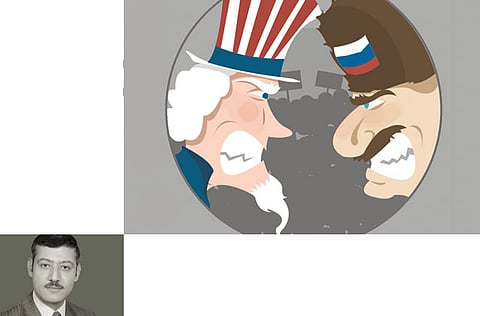Arab Spring revives Cold War alignment
Anti-US powers lean towards an alliance to prevent Washington from taking advantage of the Syrian crisis

For the first time since the end of the cold war two decades ago, Russia and China used the veto twice in the UN Security Council to block a resolution regarded particularly in Moscow as another western attempt to ignore its interests in the international arena. Russia’s firm position in defence of the Syrian regime is seen as a clear departure from post-Soviet Kremlin policy which until recently tried to avoid a direct clash with western powers and hence a resumption of the cold war animosity.
That does not seem to be the case anymore. Although many insist that Russia would still be willing to sell its ally in Damascus if the right price is offered, Moscow’s self-confidence is indeed growing and seems to be willing more than before to challenge western policies when its interests deem that necessary. The Russian-Chinese co-ordination on many world issues, including in the UN Security Council, makes it almost certain that the West will, from now on, face tougher resistance to its polices from underprivileged powers in the international system.
Indeed, over the past few years, especially after the US invasion of Iraq, Russia started to show more resistance to US hegemony particularly in the Middle East, but the Arab Spring may have provided one more incentive for Moscow to confront western policies in the region. For many, the Arab Spring may act as the trigger for a new east-west rivalry and could lead to reshaping the international system. The argument on the end of US hegemony and the emergence of a multi-polar system has been made several years ago, but gained more ground after the dramatic events of the Arab Spring.
In 2006, for example, Richard Haass, Chairman of the Council on Foreign Relations, an influential think thank based in New York, insisted that the age of US supremacy is coming to an end. He blamed the George W. Bush administration for contributing to eroding the hegemonic position of the US, which was described as the shortest in the history of the great powers.
Yet, the declining influence of the US in the Middle East and the world at large cannot be attributed only to self-created mistakes. It is a natural outcome of a dynamic international system that leans towards preventing any single state from acquiring dominant power. This has always been the case throughout history. In 19th century Europe, the balance of power system described the process whereby smaller powers tended to form temporary alliances of convenience to counterbalance the dominant military state in the system. The membership of these alliances changed over time as the different states became more powerful potential hegemons.
From time to time war broke out and was used as a means to cut down the dominant state and distribute power more evenly in the system. For most of this period, statesmen and scholars thought that the balance of power was a self-regulating system and that it looked after itself. French Emperor Napoleon Bonaparte discovered this equation when his attempt to dominate Europe was challenged by an alliance of middle powers and was ultimately defeated and he was forced to retreat inside France. Germany was similarly punished for attempting to control more than the other great powers would have allowed it to get.
In the post-Cold War era, the absence of a countervailing power or a group of powers in the system allowed the US the opportunity to dominate world politics. Indeed, the US made several mistakes that contributed to undercutting its influence but the other powers — regional and global — while realising that war against the US was not an option, they nevertheless made sure that Washington’s policies would fail in several parts of the world.
When the Arab Spring began, the anti-US powers — Russia, China, and indeed Iran — did not seem to be bothered by the removal of pro-US regimes in the Middle East and North Africa. On the contrary, Iran, for example, hailed the revolutions in Tunisia and Egypt and saw them as the beginning of an Islamic awakening. When it came to Libya, Russia and China, both had considerable investment in the country, opposed western policies especially when it became clear that Nato was taking the UN mandate beyond providing protection to civilians and towards removing the regime of Muammar Gaddafi. Syria was perhaps the clearest case when the interests of the big regional and international powers have completely diverged. Syria has created the sort of polarisation and division in the international system that has not been seen since the end of the Cold War.
Anti-US powers leaned towards forming an alliance to prevent Washington from taking advantage of the Syrian crisis and hence reassert itself as the hegemon in the Middle East. The outcome of the conflict in Syria is likely therefore to end up leading to shifts and changes not only in the region but in the global balance of power too.
Dr Marwan Kabalan is the Dean of the Faculty of International Relations and Diplomacy at the University of Kalamoon.
Sign up for the Daily Briefing
Get the latest news and updates straight to your inbox


